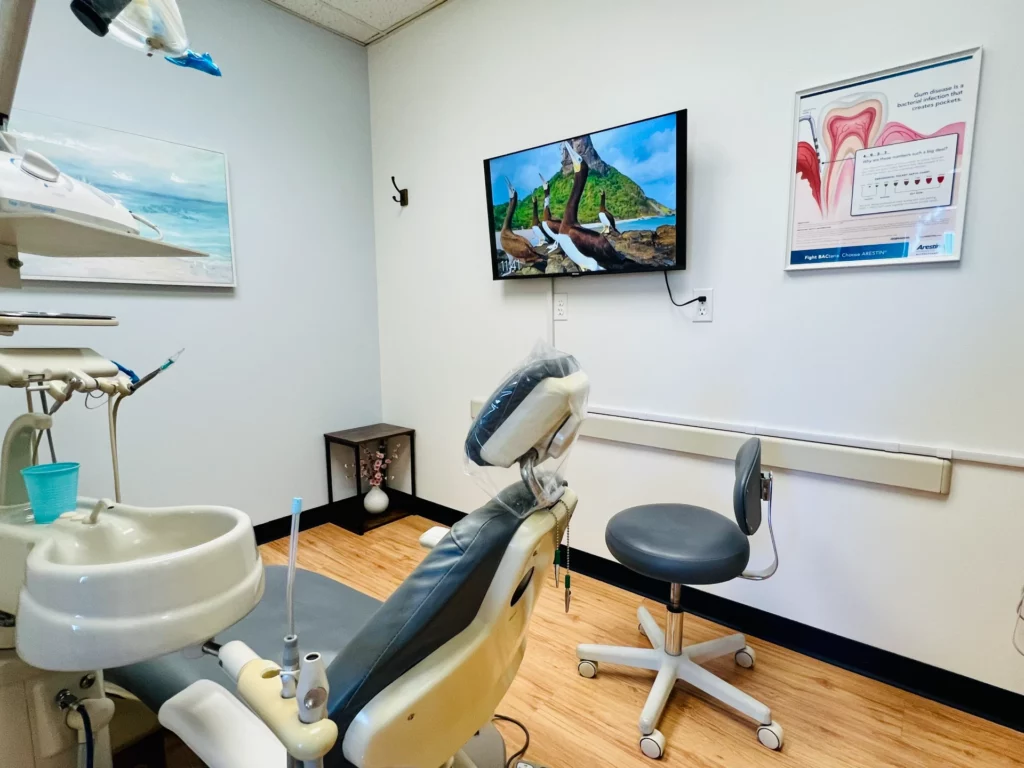If you have been experiencing jaw pain and discomfort, you could be suffering from temporomandibular joint disorder (TMJ/TMD). This condition can cause quite a bit of pain and interfere with your day-to-day life, but with proper treatment from our dentists, you can restore the health of your jaw and eliminate the discomfort of TMJ/TMD.
Without proper intervention, a TMJ disorder can drastically affect your day-to-day life. The joint can wear down over time, causing persistent discomfort or pain. So, be proactive – schedule an appointment to discuss TMJ treatment options with our caring dentists. Call Route 40 Family Dental at (410) 465-1868 to get started now!
TMJ/TMD are terms used to refer to a disorder of the temporomandibular joint. This small, delicate joint is located just below the ear and is responsible for connecting the jaw to the skull. If it becomes inflamed, damaged or malpositioned, it can cause a variety of different symptoms and issues, collectively referred to as Temporomandibular Joint Disorder, or TMJ/TMD.
TMJ/TMD can have a number of different causes. A few of the most common causes of TMJ/TMD are teeth grinding (bruxism), a malpositioned bite, excessive jaw muscle use (such as chewing gum for multiple hours per day) and inflammatory diseases like arthritis. Each case is different, which is why TMJ/TMD is often considered very difficult to treat.
There are a few different recognizable symptoms of TMJ/TMD. The symptoms you experience will differ based on the severity of your condition. In more mild cases of TMJ/TMD, your symptoms may be limited to pain and tenderness in your jaw, aching facial pain, and “crackling” or “popping” noises when chewing. You may also have trouble opening your mouth all the way.
In more serious cases of TMJ/TMD, you may experience severe, migraine-like headaches as well as jaw “locking” which may make it difficult to open and close your mouth. You may have trouble chewing properly due to the pain of your TMJ/TMD.

There are a few different ways that dentists can help with TMJ/TMD. If your issue is being caused by a poor bite position, orthodontic treatment like clear aligners or braces may be recommended to correct the position of your teeth and jaw. TMJ/TMD caused by teeth grinding may be addressed using a nightguard to prevent direct, tooth-to-tooth contact.
Another commonly-used treatment is called “oral appliance therapy.” Oral appliances for TMJ/TMD look somewhat like a nightguard or athletic mouthguard. They are designed to shift the position of the jaw and take pressure and stress off of the temporomandibular joint. This encourages proper healing of the joint and helps provide you with relief from the pain and discomfort of TMJ/TMD.
The proper treatment for TMJ/TMD varies based on your condition and its suspected cause. If you are suffering from this disorder, it is important to see a qualified and experienced dentist right away. Contact us now to schedule an appointment.
Temporomandibular joint disorder (TMJ) is a condition that affects the joint that connects the jawbone to the skull. Symptoms of TMJ disorder can include pain, discomfort, and difficulty opening and closing the mouth. Botox has been found to be effective in treating TMJ disorder. Here are some of the benefits of using Botox for TMJ:
It’s important to note that Botox is not a permanent solution for TMJ disorder, and additional treatments may be required to maintain the benefits. Additionally, Botox should only be administered by a qualified medical professional with experience in treating TMJ disorder.
If you’re looking for TMJ Botox near you, you’re in the right place! Dr. Lee is trained and certified to administer Botox and is conveniently located right here in Ellicott City. If you have questions about Botox for TMJ, give us a call or schedule your appointment online today!
TMJ surgery is typically considered a last resort for treating temporomandibular joint disorder (TMJ) after conservative treatments have been exhausted. Surgery is usually recommended only in cases where the patient experiences severe and persistent pain, difficulty with jaw movement, and significant functional limitations despite conservative treatments. Here are some situations where TMJ surgery may be needed:
It’s important to note that TMJ surgery is a complex procedure that carries risks, and it may not always result in complete pain relief or functional improvement. Patients should consult with a qualified oral and maxillofacial surgeon or TMJ specialist to determine if surgery is the appropriate treatment option for their specific case.
The terms TMD and TMJ are often used interchangeably, but there is a difference between them. TMD stands for temporomandibular disorder, which refers to a group of conditions that affect the jaw joint and the muscles responsible for jaw movement. TMJ, on the other hand, refers to the temporomandibular joint itself.
In other words, TMD is a broad term that encompasses a range of conditions that can affect the TMJ, while TMJ refers specifically to the joint that connects the jawbone to the skull. TMD can cause pain, discomfort, and difficulty with jaw movement, and can be caused by a variety of factors, including injury, arthritis, and teeth grinding.
While TMJ is the joint that connects the jawbone to the skull, TMD is a complex condition that involves the muscles, ligaments, and bones in and around the TMJ. TMD can affect the joint’s function and cause pain and discomfort in the surrounding muscles and tissues.
A TMJ dentist is a dental professional who specializes in diagnosing and treating temporomandibular joint disorder (TMD). Here are some ways a TMJ dentist can help diagnose and treat TMJ disorder:
Overall, a TMJ dentist can help diagnose and treat TMJ disorder by conducting a comprehensive examination, using imaging tests as needed, analyzing the patient’s bite, developing a personalized treatment plan, and monitoring the patient’s progress. By taking a comprehensive and individualized approach to treatment, a TMJ dentist can help patients manage TMJ disorder and improve their quality of life.
If you are looking for TMJ treatment near you, you’ve come to the right place! Dr. Lee is certified, trained and has years of experience helping patients address a range of TMJ conditions. Route 40 Family Dental is also conveniently located right here in Ellicott City. Give us a call or schedule your TMJ consultation online today!
There are several types of temporomandibular joint disorder (TMD) treatment options available, ranging from conservative measures to more invasive procedures. Here are some of the most common types of TMD treatment options:
Overall, the type of TMD treatment option recommended will depend on your individual symptoms and the severity of your condition. At Route 40 Family Dental, Dr. Lee will work with you to develop a personalized treatment plan that addresses your unique needs and goals.
There is no one-size-fits-all answer on how to cure TMD (temporomandibular joint disorder) as the most effective way to treat TMD will depend on your individual symptoms and their underlying causes. There are several approaches that have been shown to be effective in managing TMD symptoms and improving jaw function. After a thorough evaluation, Dr. Lee will be happy to discuss your options with you and recommend a treatment plan for your unique case.
Our patients are our biggest fans. Here are a few highlights from our public reviews.
9141 Baltimore National Pike
Second Floor
Ellicott City, MD 21042
Located above St. John’s Jewelers
Monday
8:00AM – 6:00PM
Tuesday
9:00AM – 6:00PM
Wednesday
9:00AM – 6:00PM
Thursday
8:00AM – 3:00PM
Friday
8:00AM – 2:00PM
Saturday
CLOSED
Sunday
CLOSED
We are happy to help you book an appointment or answer your questions. Please fill out our contact form and we will get back to you shortly!


